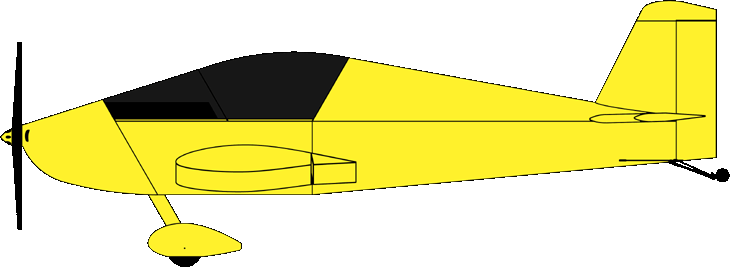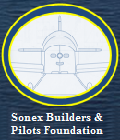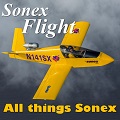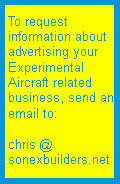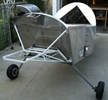

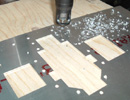
random user submitted photo
Flywheel bolts
14 posts
• Page 1 of 2 • 1, 2
Flywheel bolts
The neverending story of loose and broken flywheel bolts on older engines with not yet enough hours to warrant ditching of the whole motor. Is everybody actually doing as the manufacturers SB says: retorque every 50 hours, replace all bolts after 200 hours (if they did not break before that). Is there really no better solution?
Sonex A #0525- SG, DS.
EdgePerfomance EP915ECI, 123HP
EdgePerfomance EP915ECI, 123HP
- Kai
- Posts: 305
- Joined: Wed Jul 30, 2014 1:36 am
- Location: ICAO ENHS
Re: Flywheel bolts
Well, you're at least partially right about that one. The SB also tells you to check flywheel bolt torque at annual.
However, there is one big however, at annual a lot of owners are much closer to 50 and are unwilling to wait as long as 200 hours, as there is solid evidence that the bolts may loose their pretension before that. Anything between 72 and 196 hours has been recorded. Pretension is lost because the bolt heads dig into the soft aluminium of the flywheel: even thick, very hard large diameter washers under the bolt heads won't solve this. And of course, as long as the bolts are set in L620 you can check the torque until you are blue in the face- they remain immovable, correct pretension or not.
In addition there is of course the delicate little matter of a possible fretting main timing gear. How thar one should eventually be solved without tearing the whole thing down is still not revealed.
When the original SB came out a while back, there was a solid uproar, mainly from the NZ LAA, because the SB specified the reuse of L620. Owners who were smart enough to disregard this very bad advice, are at least able to check torque with a degree of confidence- at the suggested interval of 50 hours. Those that did not, could be heading for a surprise.
The guys in NZ came out with a very thorough SB covering the whole calamity, you could have a look at it on several links- the one enclosed below is taken from the Contrails! site:
http://contrails.free.fr/engine_jab_bolts.php
Another interesting fact is that according to specifications in the latest revision of the overhaul manual, you're still supposed to use L620. How then to check bolts for proper torque remains unanswered.
However, there is one big however, at annual a lot of owners are much closer to 50 and are unwilling to wait as long as 200 hours, as there is solid evidence that the bolts may loose their pretension before that. Anything between 72 and 196 hours has been recorded. Pretension is lost because the bolt heads dig into the soft aluminium of the flywheel: even thick, very hard large diameter washers under the bolt heads won't solve this. And of course, as long as the bolts are set in L620 you can check the torque until you are blue in the face- they remain immovable, correct pretension or not.
In addition there is of course the delicate little matter of a possible fretting main timing gear. How thar one should eventually be solved without tearing the whole thing down is still not revealed.
When the original SB came out a while back, there was a solid uproar, mainly from the NZ LAA, because the SB specified the reuse of L620. Owners who were smart enough to disregard this very bad advice, are at least able to check torque with a degree of confidence- at the suggested interval of 50 hours. Those that did not, could be heading for a surprise.
The guys in NZ came out with a very thorough SB covering the whole calamity, you could have a look at it on several links- the one enclosed below is taken from the Contrails! site:
http://contrails.free.fr/engine_jab_bolts.php
Another interesting fact is that according to specifications in the latest revision of the overhaul manual, you're still supposed to use L620. How then to check bolts for proper torque remains unanswered.
Sonex A #0525- SG, DS.
EdgePerfomance EP915ECI, 123HP
EdgePerfomance EP915ECI, 123HP
- Kai
- Posts: 305
- Joined: Wed Jul 30, 2014 1:36 am
- Location: ICAO ENHS
I stand corrected. I will add this to my annual list. It is worth noting that 200 hours is nearly annual in my case anyway. It appears that the goal of the torque test is to find any broken screws. If this is the case, it will succeed, L620 or not. If the contrails document is more in tune with the torque test, you're correct that the test will likely not reveal a problem. So, I am stuck with a problem: following the Jabiru SB, or the NZ SB. I read that only one 3300 has failed. Do you know of more?
-

rbarber - Posts: 107
- Joined: Sat Mar 10, 2012 5:47 pm
Re: Flywheel bolts
Well. if the bolts are broken you don´t need a torque wrench to check; the loose top head ends of the bolts will come out nicely with just your fingers and a hex key- that is, if they did not come out all by themselves and have started their work of destruction on your stator and magnet ring.
Even worse, there is a distinct possibility that everything checks out nicely during a "before 200 hours" annual, and that the bolts start loosing pretension shortly after that. Then they break and soon they may all be gone which again will cause your flywheel to leave the confines of your cowling. It has happened, you know, the last time I heard of it the "flying saucer" came down in a friday afternonn shopping mall parking lot. Nice!
I´m not going to tell anybody what they should do, because whatever it is, you´ll likely be up the well known creek without a paddle: in my humble opinion even the NZ SB is slightly in error, as the "very hard 1/2" washers" is not a very good idea either. I have run my engine with some diamond hard close fitting washers I got from the hot side of an Allison 501 turbine: with the torque and resulting pretension suggested by NZ, the undersie of bolts heads start to embed in the washers, and the washers will fret on the soft alu flywheel. There we go again!
Yes, there are more cases than just one. How many in the US I have no idea, but worldwide there must be hundreds. In the UK the LAA recenty found it neccessary to comment on the situation in their publication, and the list goes on and on.
Which takes us back to square one: replace all bolts every 50 hours and torque them as much as you dare? AS I said- neverending :-(
Even worse, there is a distinct possibility that everything checks out nicely during a "before 200 hours" annual, and that the bolts start loosing pretension shortly after that. Then they break and soon they may all be gone which again will cause your flywheel to leave the confines of your cowling. It has happened, you know, the last time I heard of it the "flying saucer" came down in a friday afternonn shopping mall parking lot. Nice!
I´m not going to tell anybody what they should do, because whatever it is, you´ll likely be up the well known creek without a paddle: in my humble opinion even the NZ SB is slightly in error, as the "very hard 1/2" washers" is not a very good idea either. I have run my engine with some diamond hard close fitting washers I got from the hot side of an Allison 501 turbine: with the torque and resulting pretension suggested by NZ, the undersie of bolts heads start to embed in the washers, and the washers will fret on the soft alu flywheel. There we go again!
Yes, there are more cases than just one. How many in the US I have no idea, but worldwide there must be hundreds. In the UK the LAA recenty found it neccessary to comment on the situation in their publication, and the list goes on and on.
Which takes us back to square one: replace all bolts every 50 hours and torque them as much as you dare? AS I said- neverending :-(
Sonex A #0525- SG, DS.
EdgePerfomance EP915ECI, 123HP
EdgePerfomance EP915ECI, 123HP
- Kai
- Posts: 305
- Joined: Wed Jul 30, 2014 1:36 am
- Location: ICAO ENHS
Re: Flywheel bolts
Continental and Lycoming have lots of ADs too. What you want is a company that tracks and publishes them. The information is available from the Jabiru website. Here is the NZ SB which adds a 500 hour replacement on top of Jabiru's SB. All supported aircraft and engines have SBs or ADs, as amateur builders it is our job to track them and perform proper maintenance. Fly safe and have fun.
Jim w0162 TD 3300
www.caa.govt.nz/Airworthiness_Directives/JABENG.pdf
Engine Service Bulletins and Advisory Notices from Jabiru
http://jabiru.net.au/service-bulletins
JSB022-2 Propeller Flange Attachment June 20 2014
JSB031-2 Jabiru Engine Through Bolts September 10 2013
JSL009-1 Starter Solenoid June 5 2013
JSL008-1 Valve Spring Washer Adverse Wear Dec 21 2012
JSB033-1 Piston Circlips Aug 17, 2012
JSL007-4 Alcohol Lead Compression Ratio Fuel Guidance Dec 6 2011
JSB014-2 Propeller Installation Maintenance June 9 2011
JSB031-1 Jabiru Engine Through Bolts & JSD031-1 Service Directive April 14 2011
AVDALSR071-2 Through Bolt & 12 Point Cylinder Base Nut Installation August 9 2011
AVDALSR050-1 Procedure Engine Through-Bolt Nut Installation June 25 2008
Note: We recommend that operaters reading JSB031-1 should also read AVDALSR071-1 and AVDALSR050-1
JSB012-2 Jabiru Engine Flywheel Attachment Dec 22, 2010
JSB018-2 Jabiru Engine Tuning May 7, 2009
JSB021-1 Configuration Update 1 J160-C Jan 14, 2009
JSL005-1 Starter Motor Earth Cable September 1, 2008
JSB022-1 Propeller Flange Attachment July 28, 2008
Dipstick Settings & Comparisons April 4, 2008
JSB010-3 Statement of Compliance to ASTM LSA Feb 20, 2008
JSL004-1 Engine Cooling J230 Jan 29, 2008
JSL002-3 Engine Economy Tuning Cancellation of Service Bulletin Letter Oct 5, 2007
JSB016-1 Engine Cooling Apr 19, 2007
JSB013-1 Engine Rocker Chamber Vent Aug 8, 2006
JSL003-1 Fuel Tank Sealant Mar 11, 2005
JSB004-3 Jabiru_Engine Oil Pump 31 Mar, 2005
JBS005-1 Jabiru 6 Cylinder Engine Muffler Oct 10, 2004
JSB001-1 Revised Jabiru Engine TBO's May 11, 2004
Oil Cooler Mounting Instructions Aug 15, 2001
JSBA3 Fuel Systems Cleaning Jan 25, 2000
Jim w0162 TD 3300
www.caa.govt.nz/Airworthiness_Directives/JABENG.pdf
Engine Service Bulletins and Advisory Notices from Jabiru
http://jabiru.net.au/service-bulletins
JSB022-2 Propeller Flange Attachment June 20 2014
JSB031-2 Jabiru Engine Through Bolts September 10 2013
JSL009-1 Starter Solenoid June 5 2013
JSL008-1 Valve Spring Washer Adverse Wear Dec 21 2012
JSB033-1 Piston Circlips Aug 17, 2012
JSL007-4 Alcohol Lead Compression Ratio Fuel Guidance Dec 6 2011
JSB014-2 Propeller Installation Maintenance June 9 2011
JSB031-1 Jabiru Engine Through Bolts & JSD031-1 Service Directive April 14 2011
AVDALSR071-2 Through Bolt & 12 Point Cylinder Base Nut Installation August 9 2011
AVDALSR050-1 Procedure Engine Through-Bolt Nut Installation June 25 2008
Note: We recommend that operaters reading JSB031-1 should also read AVDALSR071-1 and AVDALSR050-1
JSB012-2 Jabiru Engine Flywheel Attachment Dec 22, 2010
JSB018-2 Jabiru Engine Tuning May 7, 2009
JSB021-1 Configuration Update 1 J160-C Jan 14, 2009
JSL005-1 Starter Motor Earth Cable September 1, 2008
JSB022-1 Propeller Flange Attachment July 28, 2008
Dipstick Settings & Comparisons April 4, 2008
JSB010-3 Statement of Compliance to ASTM LSA Feb 20, 2008
JSL004-1 Engine Cooling J230 Jan 29, 2008
JSL002-3 Engine Economy Tuning Cancellation of Service Bulletin Letter Oct 5, 2007
JSB016-1 Engine Cooling Apr 19, 2007
JSB013-1 Engine Rocker Chamber Vent Aug 8, 2006
JSL003-1 Fuel Tank Sealant Mar 11, 2005
JSB004-3 Jabiru_Engine Oil Pump 31 Mar, 2005
JBS005-1 Jabiru 6 Cylinder Engine Muffler Oct 10, 2004
JSB001-1 Revised Jabiru Engine TBO's May 11, 2004
Oil Cooler Mounting Instructions Aug 15, 2001
JSBA3 Fuel Systems Cleaning Jan 25, 2000
- hickej
- Posts: 146
- Joined: Tue Dec 24, 2013 2:20 am
I have been thinking about this and have a few thoughts to share:
1) given that the majority of the screws don't fail or loosen, and assuming that the screws themselves are not the issue, what variables remain?
a. Proper application of torque.
b. L620 curing too quickly
c. Harmonics or resonance induced by something (really complicated issue ) out of balance.
2) If the screw arrangement was under engineered, all, or nearly all, would fail.
3) If it is inconsistent application of torque, this would fit the results seen. This could be caused by the L620 curing too quickly, or simply taking too long to torque the screws.
4) Harmonics and resonance. Yuk! Given the cycle count in any engine, even seemingly small things can eventually lead to failure. I can't begin to speculate how the crank would flex due to an imbalance from the other end.
The point is, the frequency of failure tends to indicate either inconsistent torque application, or an imbalance of some sort.
At any rate, I will replace my screws, and use the L620 again. I will also run a short test to determine the cure rate prior to installing the screws in the engine, just so I can make sure I get the desired torque. If anyone has more thoughts on the matter, please share!
Rob.
1) given that the majority of the screws don't fail or loosen, and assuming that the screws themselves are not the issue, what variables remain?
a. Proper application of torque.
b. L620 curing too quickly
c. Harmonics or resonance induced by something (really complicated issue ) out of balance.
2) If the screw arrangement was under engineered, all, or nearly all, would fail.
3) If it is inconsistent application of torque, this would fit the results seen. This could be caused by the L620 curing too quickly, or simply taking too long to torque the screws.
4) Harmonics and resonance. Yuk! Given the cycle count in any engine, even seemingly small things can eventually lead to failure. I can't begin to speculate how the crank would flex due to an imbalance from the other end.
The point is, the frequency of failure tends to indicate either inconsistent torque application, or an imbalance of some sort.
At any rate, I will replace my screws, and use the L620 again. I will also run a short test to determine the cure rate prior to installing the screws in the engine, just so I can make sure I get the desired torque. If anyone has more thoughts on the matter, please share!
Rob.
-

rbarber - Posts: 107
- Joined: Sat Mar 10, 2012 5:47 pm
Re: Flywheel bolts
Oh, there´s no doubt about the reason- the culprit is torsionals/harmonics; most likely in combination with a not exactly over engineerd setup.
Now, WHY some installations have these vibrations, and others not, is an altogether different matter. Multiple reasons have been pointed out, like loose prop bolts, prop imbalance, unapproved prop, loose prop flange bolts (why would they loosen up?), faulty combustion (a lot of items under that topic alone). The list is not exactly short!
And then there are engines with nothing wrong with them at all, that also fail.
Now, WHY some installations have these vibrations, and others not, is an altogether different matter. Multiple reasons have been pointed out, like loose prop bolts, prop imbalance, unapproved prop, loose prop flange bolts (why would they loosen up?), faulty combustion (a lot of items under that topic alone). The list is not exactly short!
And then there are engines with nothing wrong with them at all, that also fail.
Last edited by Kai on Tue Sep 30, 2014 3:39 pm, edited 1 time in total.
Sonex A #0525- SG, DS.
EdgePerfomance EP915ECI, 123HP
EdgePerfomance EP915ECI, 123HP
- Kai
- Posts: 305
- Joined: Wed Jul 30, 2014 1:36 am
- Location: ICAO ENHS
Re: Flywheel bolts
Can anyone (Rob?) figure out how to do this bolt replacement without pulling the engine? I'm not sure it's possible. I'm approaching 200 hours and it's a mild concern.
Mike Kelley
The Villages, FL 32163
Sonex 1284, N154MK, Tri-Gear w/Jab 3300
The Villages, FL 32163
Sonex 1284, N154MK, Tri-Gear w/Jab 3300
-

sonex1284 - Posts: 39
- Joined: Sat Jan 07, 2012 12:59 pm
I have done the torque routine with the engine mounted, so it can be done. Remove the screws holding the spider, and pull it out. The Alternator magnets are quite strong, so be careful. The spider will not move far, but will move far enough to get in with a torque wrench. I have not tried to replace the screws yet, but will soon. I will let you know how it goes.
-

rbarber - Posts: 107
- Joined: Sat Mar 10, 2012 5:47 pm
14 posts
• Page 1 of 2 • 1, 2
Who is online
Users browsing this forum: No registered users and 8 guests
